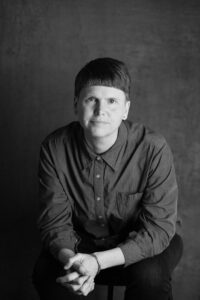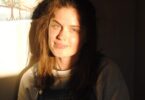It was the sound of humming that woke me, low and mournful. But when I came to full consciousness, I couldn’t hear anything. It was very late or possibly very early and the room was dark, darker than usual, a sort of pulsating soft black-grey. A fog must have rolled in off the river, dimming the lights of the surrounding buildings. As my eyes grew accustomed I started to make out the outlines of the dresser and the chair next to it. A pile of dirty laundry in the corner had been growing for weeks and had reached the height of a five-year-old. As I looked at its bulky shape, it seemed to shift a little. And then the humming started again, deep and melodic, soothing almost, until it veered up into a higher register that gave it a plaintive quality, as if it were asking a question it already knew the answer to.
We lived in a neighbourhood bordering the river, next to an industrial district, and there were often sounds at night—random banging, whirring from huge machines—but this sound was different. It was too close, for one thing. Like it was in the room. I clicked on my bedside lamp, hoping it would wake Matilde. No luck. She had her purple sleep mask clamped down over her face, and I could see her heavy-duty orange earplugs jammed in tight. She had been up late watching videos on her phone and probably planned to sleep in until eleven at least. I pushed her a little, gently at first. Her breathing changed and she gave a little huff and snort as she rolled over to her side and kept sleeping.
The humming had stopped again, and in the silence I heard a train creaking down the tracks bordering the river, and closer, the fridge gurgling its strange watery language. It felt like it was near dawn, but I wasn’t sure, so I leaned over Matilde to look at the clock on her bedside table. 5:15am. Goddamn it. Another night of hopeless sleep.
The pile in the corner shuffled again and I shook Matilde more violently this time. She awoke with a start, sitting up and tearing off her sleep mask in one motion.
Her voice was furious, creaky from sleep.
Sorry honey. It’s just. There’s something in the corner. Under the laundry.
She looked at me uncomprehendingly, then pulled out her earplugs. What?
There’s something in the corner.
She glanced at the pile of clothes. The laundry? You woke me up because of the fucking laundry? She shook her head and pulled the mask back over her eyes and laid back down. Seriously. Just go to sleep for once. Go to sleep. She rolled back over on her side.
And turn the lamp off, she said, and promptly fell back to sleep.
I obediently clicked the lamp off and strained in the darkness to hear whatever I could. But I couldn’t hear anything. No shuffling, no humming. Nothing at all.
In the last few months I’d been up a lot in the night, thinking. Worrying, to be more precise. I wondered about things like how many old people would die alone in their sweltering apartments in the next heat wave, recalling details from the obituary page read in passing, some retired nurse who died in her third floor walk-up, too stultified by the heat to make it out of her bed. Sometimes I’d keep myself up half of the night trying to recall what I knew about salmon or orcas, making lists of things I needed to research come daylight. I wondered if the sea stars would come back, tried to remember the last time I’d seen one, more than one, a dozen purple stars splayed over the rocks at Bellhouse Park six or seven years ago on Galiano Island. I thought about earthquakes, “the big one” that was due on our coast, and the size of the tidal wave that would follow. I remembered footage from Japan, people running up the stairs of a concrete parking garage as the river rose. I contemplated the ricketiness of our own six-storey wood frame, how near the river, how quickly it would go up in flames. I thought of people fleeing the fires in the interior, in California and Oregon, stuck on stretches of burning road, cooked to death in their own cars. Late at night I thought of all this and I couldn’t sleep.
I had started to depend on melatonin, chasing a few pills down with a glass of water doctored with a dropperful of valerian tincture. Usually this slowed down my mind enough to bring on sleep, although sometimes even this didn’t work. Lately I’d been experimenting with the CBD gummies that Matilde brought home from the pot shop down the block. They tasted like crap, the strong weedy flavour only partially masked by sickening fake strawberry, but I chewed them dutifully, desperate for a full night of sleep.
There was no point in taking any more drops or chewing any gummies now. It was nearly morning. I was awake. And there was no reason to stay in bed—Matilde would shove me away if I tried to snuggle her, and in an hour or so the construction across the street would start up, the cement machine clanking and grinding, the workers yelling as they banged their hammers. Down by the river the pile-driving for the new condo towers would begin, each heavy clang hammering into my brain, accentuating the headache I had woken up with, my mouth dry as if I had downed an entire bottle of red wine the night before.
I looked over at the pile of laundry. I couldn’t see it very well in the dim light but I knew what it contained. Three weeks of dirty clothes, mostly black because that’s what my wife wore, drapey dresses and skirts smelling faintly of patchouli and cedar. She used to wear tight mini-dresses, bustiers and fishnets, but in the last couple of years, her style had changed.
I hoped that Matilde would actually get out of bed today and do a few loads. We had made a deal several months ago, when Matilde got laid off from work, that she’d do all of the housework except for cooking—a chore we’d share—and I would pay the bills. So far I had kept my part of the bargain, but Matilde hadn’t. Instead of cleaning, she got in touch with her creative side. She’d start projects—crocheting, painting, felting wool—and leave the materials strewn all over the living room. When she baked, which was often these days, she didn’t bother to mop up the flour and cocoa powder, preferring to leave a light dust over the counters and kitchen floor. The couch cracks held the crumbs of oatmeal cookies and double chocolate brownies. Some days the unrelenting mess filled me with deep resentment, a helpless rage. On other days, I accepted it as our new life together. Whatever sort of day it was, I tried not to complain too much because if I did Matilde would stop touching me for days.
A Drake song that Matilde had been playing a lot on her phone recently ran through my mind, something catchy about we’ll see what’s about to happen next, and I hummed it thoughtlessly as I climbed out of bed. I thought I heard another voice join mine, humming at a lower register. I turned to look at the other side of the bed. Matilde was still knocked out under her sleep mask, a grim set to her mouth as if even in sleep she was saying you’d better not fucking wake me up. I don’t know why I looked at Matilde—I knew very well where the humming was coming from. Turning my head slowly towards the heap of clothes, I watched as the pile started to shutter, black shirts and dirty tights falling down to the floor. The humming grew louder. A head emerged, bald, with a face puckered up like a knot of ginger. It was hard to tell the colour of the eyes, but they were large, bulging, the kind of eyes that as a kid I used to call googly eyes. They were staring right at me, not unfriendly. Then the humming stopped.
A thousand gorse fires on the island, croaked a dry voice.
I stared at the ancient face, surprised I wasn’t more afraid.
Evacuate the towns. Crouch in a ditch.
I looked over at Matilde, but she was still fast asleep.
The rain. The rain. The floods the floods the floods. The voice was little more than a scratchy murmur, the voice of someone who had just woken up or who hadn’t spoken in a long time.
The person shrugged off the rest of the dirty laundry and stood up. They were only a little over five feet tall, a lumpy figure with large breasts in a black robe. Her face was arresting, the face of an aristocratic ancestor—a prominent nose, lots of wrinkles. Her head gleamed, more bald than a newborn’s—from what I could see she didn’t have even one hair.
The winds, she croaked. Close your eyes. The dust the dust the dust.
I knew no way to respond to this. She seemed to have appeared out of one of my bad dreams but I found it hard to believe I had summoned her.
No salmon again this year. The old woman shook her head, repeating a tsk sound.
This gave me pause. Just the night before, I had been reading about a trend growing in the last twenty years—runs of sockeye committing suicide. And at the Farmer’s Market on the weekend, the fish seller had posted a sign on her truck: “No local salmon because of poor runs.” I purchased a couple of tins of smoked tuna instead. My friend Dru had been telling me for months that I should have already given up all seafood by now—they kept sending me links to documentaries that spelled it all out. The last time we met for coffee, they told me that most of the salmon had died in the summer’s heat dome; the juveniles couldn’t survive the temperature of the water. In October, Dru had gone to see the salmon run on Bowen Island, a tradition of theirs for many years—but the run was non-existent. They saw only one salmon, leaping pathetically as it tried to escape the steel contraption that had been built by the local fish and wildlife workers. Volunteers would catch the salmon and then transport them upstream so that at least a few made it to their traditional spawning grounds.
The old woman walked out of the bedroom and went to the couch, shifting one of Matilde’s half-painted blue canvases—she was experimenting with sharks and seascapes—so that she could sit down. She resumed humming. At times it veered into chant, at other times into a low wail. She rocked back and forth. It was discomfiting to witness but I didn’t know how to make her stop, or if I should make her stop, so I went over to the breakfast nook and started making coffee, watching her out of the corner of my eye.
Outside the window, the seagulls were having their usual morning scream fest, circling around each other, diving towards the roofs and back up again with seemingly endless energy. They might have been harassing a crow, or some bigger bird, a bald eagle after their nest of precious babies—although this was less likely. When we first moved in, I used to see the occasional bald eagle or heron gliding over the river, but I hadn’t seen either in a couple of years. The gulls reeled past the window, crying their high-pitched cries.
The old woman turned to watch them, transfixed. She quietly mimicked their sounds, then tapped and scratched at the window as if she could communicate with them. But the seagulls paid her no mind.
I pulled a bag of coffee out of the fridge. I thought of warning her that I was going to grind the beans, that it would be loud for a minute, but something stopped me. She didn’t exactly invite conversation. She acted like I wasn’t even in the room.
At the sound of the coffee grinder Matilde started to stir in the bedroom. I heard a huge yawn that I knew was accompanied by an equally huge stretch, her limbs starfished across the bed, feet arching. I heard her roll over and was afraid she’d go back to sleep.
Babe, I called. Babe? I think you should come out here. Right now please.
Even from the other room I could hear her theatrical sigh. I knew what was coming next and sure enough a Drake song started up, the beats echoey and anemic as they drifted out of Matilde’s phone. She padded out a couple of minutes later, her black silk robe gaping open as she scratched her breast. She gave a big yawn and smiled at me, then turned to the couch, stopping short when she saw the old woman.
The woman had gone back to her moaning and rocking. She was bent over, looking at the floorboards. At times the moans sounded like she was in pain; at other moments the sounds were almost exultant.
What the hell? You could have told me we have a fucking banshee in our house.
A banshee?
Clearly a banshee. Matilde made a sweeping gesture. Look at her. All crone-like. Wailing. Pure banshee. She turned off the Drake song and set her phone on the kitchen counter.
I would call it moaning, I said.
Moaning, wailing, whatever. She’s a banshee. You know what this means, don’t you?
I started spooning coffee into the espresso maker. Not really.
It means one of us is going to die.
We’re both going to die at some point.
You know what I mean. It means one of us is going to die, like, soon. That’s what a banshee means.
She could be here for one of the neighbours.
But then why would she shack up with us? She’d stay at their place if it was one of them. Matilde’s tone was breezy, as if it was neither here nor there if one or both of us died in the next day or two. She pulled a long brown curl in front of her face and started trying to untangle it.
As was often the case, Matilde’s reaction was not what I expected. I thought she might be afraid of this witchy-looking woman, or perhaps blame me, claim that all the disasters I’d been reading about had somehow conjured her up—our own personal little piece of the larger looming chaos. But Matilde seemed mostly just calm, slightly curious. And she hadn’t smoked up yet today, so I knew it wasn’t that fake numbed-out calm she got from pot.
She picked up her phone and walked over to the old woman, moving a painting and leaning it next to the couch so she could sit next to her. The woman was still rocking back and forth, her arms wrapped around herself, humming and looking at the ground.
Hey, look here, Matilde said. Do you like dancing?
She opened a video on her phone, some silly thing with Drake in it that she’d already shown me. A catchy pop hip-hop song started up and she set the phone on the banshee’s lap.
It’s a dance-off. She chuckled. He’s totally going to lose. But isn’t he cute? Later he does this really bad snake dance thing. She shook her head. It’s so funny.
The banshee looked up then, and took the phone in both of her hands. She watched the video intently. After awhile, she started to smile.
I knew it, said Matilde. She looked over at me. I knew she’d like the dances.
I watched the coffee burble up its little spout, hissing steam, and I felt annoyed. Here was Matilde, making fast friends with this strange creature, who might be an apparition, actually, now that I thought of it, but in recent months she wouldn’t even pick up the phone and call a friend. During the first year of the pandemic she’d continued to reach out, booking Zoom cocktail dates and coffee walks, but in the last couple of years she acted like she couldn’t be bothered, and when I asked her about it, she shrugged it off, saying she just didn’t feel that connected to most of them anymore. It worried me.
When the coffee was done I brought them each a cup—a big latte for Matilde, who liked her coffee milky, and a single shot of espresso for the banshee, who perhaps didn’t drink coffee at all.
His hair is looking really good, Matilde said. And his beard. So dreamy. Sweetie, she turned to me. I want you to give me a Drake haircut. This week, okay? Bring your clippers home.
I watched as the old woman gingerly lifted the little cup and sniffed the coffee. Her eyes were closed. Sure, honey, I said. Sure.
◊ ◊ ◊
On the train home I was exhausted. It had been a shitty day at work: late clients, overly picky clients, dye jobs that took too long, a hurried cold lunch from the corner store. I hadn’t wanted to leave Matilde with the banshee, but I couldn’t cancel the day—we needed the money. And Matilde had insisted that I go to work, that she’d be fine alone with the banshee, that she’d figure it out. I’d hesitated, but after a moment agreed—for although the banshee was exceedingly odd in her appearance and behaviour, she seemed pretty tame overall. She wasn’t aggressive, she didn’t lunge at us or play with the kitchen knives. She did say a lot of creepy shit, though. Although the things she said weren’t any creepier than the news I doom-scrolled through every morning.
Matilde had recognized the old woman as a banshee right away. But how? A banshee could show up in many forms, from what I’d read in my quick search on the morning train ride. They usually appeared in a womanly form, sometimes combing long blonde or black hair. This was why some superstitious people in Ireland never picked up a comb from the ground—the comb might have been left by a banshee trying to entrap them. A banshee might show up as a washerwoman who, upon closer inspection, turned out to be washing clothes not in water but in blood. They could be weasels, they could be birds, they could turn up as toads or eels or even goats. They could often be found near rivers, and we lived near a river. Maybe we’d already been visited by one, and just didn’t know it.
Last summer, a crow moved onto our balcony for an entire week and acted very strangely. We initially thought it was injured but came to realize that wasn’t the case—it was just hanging out. It often sat with its wings fanned around it like a black feathered gown. It was another burning hot August, the skies hazy with the smoke from forest fires, the light a painful orange, somehow both glaring and muted, and the crow often appeared to be panting, its little beak open to catch the air. Each morning I would stumble out of the bedroom to make coffee and the crow would hop up and waddle over to the sliding glass door, staring at me and caw-caw-cawing as if its life depended on it. I was afraid of it and never wanted to open the door, but Matilde would leave it little bowls of water and crusts of bread. After many days, the crow was just gone one morning. We didn’t even see it fly away.
Had that been a banshee? No one we knew had died around that time, although our next-door neighbours did move away the next week, and Matilde got laid off the week after.
◊ ◊ ◊
Back at home Matilde met me at the door, a little frantic. She pulled me into the foyer and whispered in my ear. This is getting really strange.
I thought you liked strange, I said.
She shushed me, putting a finger dramatically to her lips. She’s on the balcony, she said.
The apartment smelled pretty awful, like charred chocolate cake underlaid with something chemical, but it was cleaner than it had been in weeks. Matilde’s canvases were stacked up in a corner in the living room and her painting supplies had been put away. Someone had swept the dirt out of the entryway and the kitchen counters were clean. A lumpy brown mess sat on a plate in the middle of the table—the burnt, unfrosted cake.
I hope she doesn’t jump, I said. Although maybe if she does she’ll turn into a crow and fly away. I heard they can do that.
You’ve got to stop reading Wikipedia. She tugged my arm, pulling me through the kitchen and towards the balcony door. And I promise you, whatever you read in your research won’t prepare you for this.
Lolling on the over-priced chaise lounge Matilde had insisted we buy in the summer and then never used was the banshee, lit up by the bright patio lights. She was crammed into a pair of fishnets and a leopard print mini-dress that I thought Matilde had given away some time ago. Over this she wore a little black leather vest criss-crossed with thin silver chains. Her lips were painted a bright pink. Even though it was frigid out, she didn’t seem bothered by the cold as she stretched up her arm, holding Matilde’s phone, and snapped a picture of herself. She was younger than she had been this morning; her skin was smooth, and she had sprouted a soft cap of short black hair.
Why is she dressed like you? I asked. I mean, the old you.
Matilde gave me a look. It’s still me, she said. It’s still my clothes.
You haven’t worn anything like that in months. Maybe years.
And you miss it, don’t you? Matilde leaned in and kissed me. I kissed her back, holding her hips, remembering a tiny pair of black lace panties she used to slip on and how it made me wild just to see a slice of her silky pubic hair peeking out. There were handcuffs sitting at the bottom of our tickle trunk that hadn’t seen the light of day in over a year. Our dildos were no doubt covered in dust. I felt like I barely knew how to kiss her anymore. This thought made me stop the kiss.
It’s been a long time, I said.
I know. She snuggled into my arms. It felt nice, but I was also a bit wary. She didn’t touch me very often anymore and in the last few months she didn’t seem to want to talk to me much either. Whenever I’d try to tell her about the things I was reading, about an article or a video I’d found, something Dru had told me, she’d only listen for a sentence or two, and then she’d tell me she couldn’t talk about it. It’s too overwhelming, she’d say. You’re stressing me out. I can feel my jaw getting tight. And then she’d go out on the balcony to smoke a bowl.
And an image would rise in my mind, the flaps of a cardboard box closing, closing, and I would turn away, wondering who I could talk to, who would hear me if she couldn’t.
I looked out the sliding doors to where the banshee lay preening. She lifted up one leg and pointed her toes, admiring her skin poking through the fishnet.
I was hoping you might have made dinner, I said. I’m starving.
Matilde gave me a look, but stepped to the kitchen and opened the fridge. All we have is wilted kale, some potatoes, and an old hunk of tofu. She sighed. I’ll make a stir-fry if you get rid of the banshee.
Get rid of her? How?
I don’t know. Put her in the bathtub?
What are you saying? Drown her? I don’t even know who I’m married to right now.
I didn’t say drown her. Matilde was rifling around in the crisper, pulling out some old garlic that had grown long green shoots like fingernails and a couple of crushed-looking onions.
You implied it.
I thought maybe she’d just turn to water or something. I don’t know.
You aren’t making any sense, I said crossly. Did you smoke already?
I smoked all day. I gave the banshee some too.
You got the banshee high? Jesus Christ. I took a cutting board out of the cupboard and started pulling the skins off the onions.
She didn’t really seem to get high. She didn’t seem to like it. She choked, and then waved her hand away when I tried to give her another toke.
Nice.
You don’t need to be sarcastic. What did you expect me to do?
I don’t know—not smoke for one day because we have a goddamned shape-shifter in our house? I opened a cupboard to take out a glass for water and shut it harder than was necessary. As the heat that always accompanied an argument started to rise in my body, I heard the balcony door slide open. The banshee clomped into the kitchen in a pair of Matilde’s old heels, smiling. Unsurprisingly, she was playing a Drake song on the phone. She gyrated a bit, bumping the kitchen counter.
Good fucking god, I said.
What do you know? I’ve been dealing with this all day. You were barely out the door before she started tearing through our closets.
What’s that chemical smell?
I don’t know. I thought it was maybe some old perfume or something she found.
That’s definitely not perfume. It smells toxic. Metallic, or something. Burning. I stepped closer to the banshee and took a whiff. Yeah. It’s definitely coming from her.
Matilde had taken the onions and was chopping them on another cutting board, wiping her eyes with a shoulder as they started to water.
My own eyes were stinging from the chemical smell mixed with the onion fumes and I blinked the tears away. Honey, I know you’ve spent a lot of time alone the last few years. And I know that can make us lose touch with reality a bit, especially when we smoke a lot of weed.
“We” don’t smoke a lot of weed. I do. And you can stop it with the fakey counsellor voice.
I’m not trying to condescend, babe. I’m just trying to understand.
The banshee was looking back and forth at our faces as if watching a tennis match. She swayed from side to side with her whole body, clutching Matilde’s phone. I noticed her fingernails were painted a rich burgundy, a colour Matilde used to put on when we went out dancing.
Hey, I said. She’s not humming anymore. When did she stop?
I can’t remember.
As if on cue, the banshee set down the phone and went to the couch, pulling Matilde’s guitar case out from underneath it. Opening the case, she set the guitar on her lap and started strumming it like a harp, keening a hair-standing-on-edge little tune. She closed her googly eyes and swayed from side to side. Then she stopped singing and stared at us as if waiting for us to say or sing something in response.
The guitar was a sore spot. A year ago, in a spurt of creative ambition, Matilde had charged it to our credit card without telling me, and then proceeded to only play it twice before hiding it under the couch. It had cost a couple of hundred bucks, a couple hundred we didn’t have. But Matilde had gotten mad at me when I complained, saying she needed a creative outlet, she was depressed, and I needed to be more supportive.
I had wondered then, as I wondered now, what being supportive meant. How did we support each other? Could we continue to? Where would we each be when it all ended. And what did I mean by “when it all ended.” The apocalypse everyone was so fond of talking about, making movies about, writing novels about? What did it mean? Weren’t we already living through it, the unravelling, which had seemed to start slowly, or many of us thought of it that way. “Warming” was the word used. Repeatedly used. Like you might warm up a slice of cake or bowl of soup. But it was already warm, very warm. Who were we kidding. It was hot and getting hotter. Everything moving so fast. And where would Matilde and I go, where would our neighbours go, our friends, once every last icecap melted and the city was underwater? What would we eat, with the oceans acidified, the wheat fields waterlogged, so many cows drowning each year in the floods?
I remembered a video I’d watched a couple of weeks earlier when I couldn’t sleep. A Wet’suwet’en elder wrapped in a yellow and grey blanket, a bird design on her back, was singing and drumming in the snow when she was arrested. The officer conducted himself with unconvincing gentleness, attempting a pious expression as he took her arm to lead her away to the waiting SUV. She stopped singing for a moment to tell him, “You should be ashamed. What will you tell your children, your grandchildren? When there’s no water to drink, no food to eat?”
◊ ◊ ◊
That night, as we made our bed, pulling up the red cotton sheets and smoothing the red duvet, the banshee took off Matilde’s heels and curled up on the couch. I heard her snoring from the bedroom. When I went to drape a quilt over her, I saw that her face was even younger, the skin taut and fresh, and she was sucking her thumb, holding what appeared to be a doll she had made from the scraps of one of Matilde’s sewing projects. The veins on her eyelids were the inkiest blue, the most delicate tracery, and I felt like gently kissing each one, but instead I just patted her head.
Back in bed, I turned to Matilde. She was looking at me sadly, clutching her sleep mask and ear plugs. I’m sorry I’ve been such an asshole lately, she said. I love you.
I love you too, I said. And I leaned over to kiss her, slowly, and she returned the kiss, also slowly, savouring it, it seemed. We stayed entangled for a few minutes, her arms around my back, my hands in her messy hair, smelling her earthy scent. Then I turned off the lamp and Matilde pulled on her sleep mask and we both lied down and tried to sleep.
…
 Jen Currin’s Hider/Seeker: Stories won a Canadian Independent Book Award, was a finalist for a ReLit Award, and was named a 2018 Globe and Mail Best Book. They have also published four collections of poetry, most recently School (Coach House, 2014) and the Audre Lorde Award winner The Inquisition Yours (Coach House, 2010). They live on unceded Qayqayt, Musqueam, and Kwantlen Nation territories in New Westminster, BC and teach creative writing and English at Kwantlen Polytechnic University.
Jen Currin’s Hider/Seeker: Stories won a Canadian Independent Book Award, was a finalist for a ReLit Award, and was named a 2018 Globe and Mail Best Book. They have also published four collections of poetry, most recently School (Coach House, 2014) and the Audre Lorde Award winner The Inquisition Yours (Coach House, 2010). They live on unceded Qayqayt, Musqueam, and Kwantlen Nation territories in New Westminster, BC and teach creative writing and English at Kwantlen Polytechnic University.






